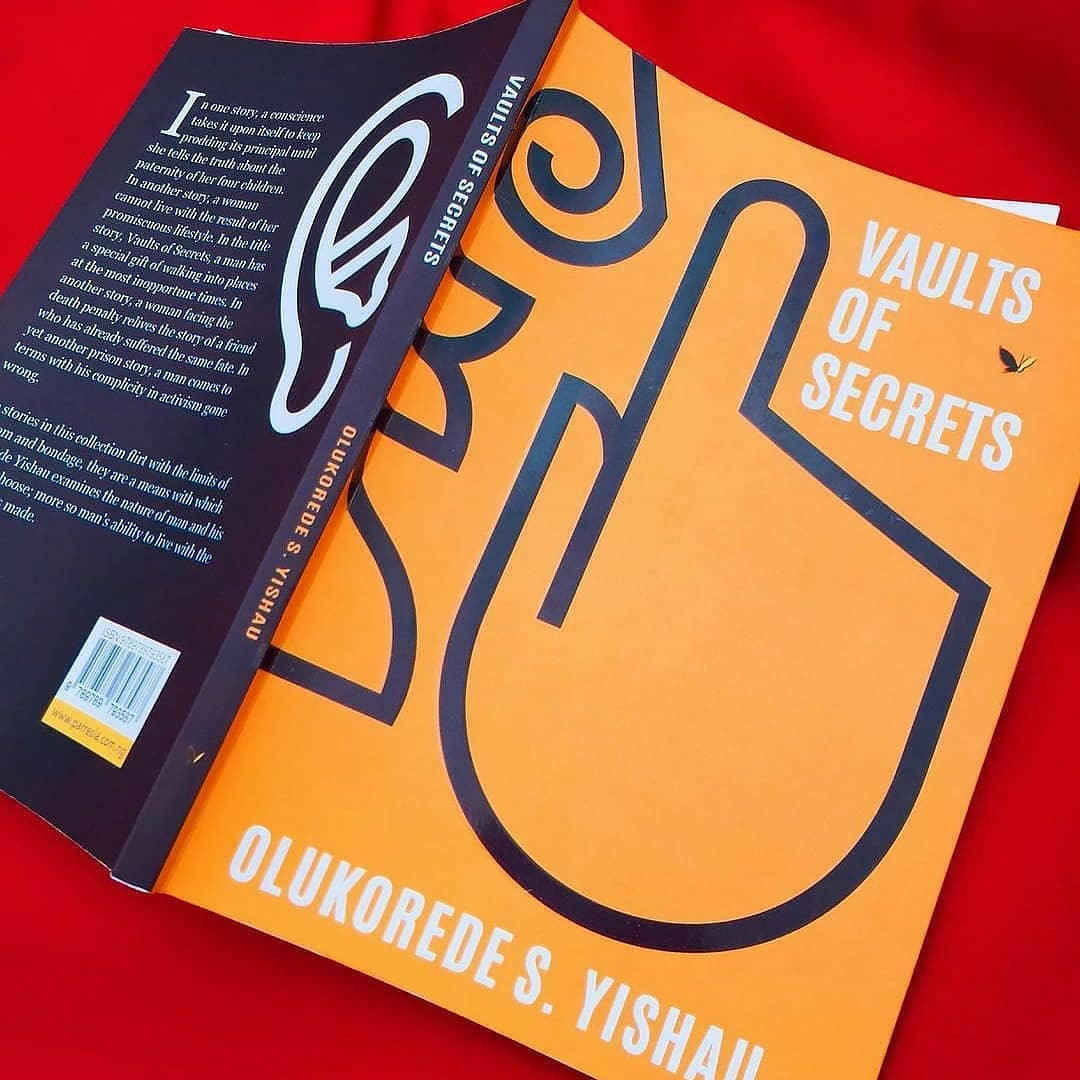BY MICHAEL OLATUNBOSUN
The book, Vaults of Secrets, is a collection of 10 short stories spanning 116 pages, each story served with the author’s intricate collection of punchy words and creative panache.
In the opening story of the book, we are treated to a tragic story of a woman whose life trajectory has been laced with bitter experiences of domestic violence, alcoholism, sex slavery and death.
In the story, ‘Till we Meet to Part no More’, Oluwakemi is on death row, and she shares her story with Elizabeth, a cell mate. We read of her sojourn in United States of America, how she meets and falls in love with a male nurse with whom she works in a care home in US. We read about their marriage and return to Nigeria to establish a business, and how a changed husband becomes abusive, and habitually beats his wife on the claim that she is the cause of his misfortune.
Advertisement
We learn that he returns home drunk one night and beats his wife. Olukemi decides to fight back, and ends up killing her husband.
Now she is in jail, waiting to be killed.
She also relates, while in jail, how she lands in America when at 14, her parents hand her to Madam Koikoi.
Advertisement
She has been sold into slavery, in fact, sex slavery, with Madam Koikoi as the chief slave owner.
So, at 18, she is exposed to pornography, and forced to service strange men for a fee paid to Madam. Even Mr Koikoi rapes her. His wife gets to know this, and a big quarrel ensues, leading to Madam Koikoi’s death. Oluwakemi gets her freedom. That was after her education. And after that she meets her husband.
We read here of the heinous atrocities that the prison officials also mete out to inmates. For instance, the work exposes the fact that male warders rape female inmates, sex is used as barter for food, to access medication that family members bring, to get better living conditions. That there is massive corruption in the prison.
This is a work of fiction, but its exposition here tallies with the revelations made by the popular investigative journalist, Fisayo Soyombo, in his report on the Nigerian prisons.
Advertisement
Elizabeth, Oluwakemi’s cellmate, recalls the events of their prison life after the death of her friend. However, a bitter reality in this story is Oluwakemi’s choice to continue staying in an abusive relationship, which eventually costs her life.
In this book, we read about Emmanuel, a journalist who has a special gift of stumbling upon shocking events in the lives of people around him.
In the story, ‘The Special Gift’, the author employs the first person point of view to tell us about Emmanuel, a journalist who is always making special unsavoury discoveries, basically walking into situations where he will chance upon secrets of friends, family and neighbours.
In this story, Emmanuel sees smoke coming out of his neighbour’s apartment, goes in to quench the fire only to catch Idato the house maid riding Mr Essien in a sex romp.
Advertisement
He goes to see a brother and chances upon him having a come back affair with his ex-wife. And ultimately, he catches his best friend’s wife in a secret threesome with his own boss, Nonso.
Essentially the narrator in this story has a special gift to discover uncomfortable secrets, and indeed has a big vault for keeping these secrets.
Advertisement
In a rather tragic story of incest between a father and a daughter, we read the story of a boy who chanced on a sad revelation that his depraved grandfather, was also his father.
This is presented in the book’s third story, ‘My Mother’s Father is my Father’. The narrator gives the reader a peep into the circumstances of his birth, a secret that has been long protected from the public because the key actors are no more.
Advertisement
He learns one day that his grandfather is his father, as his mother is his sister. The mother, an only child, had been abused at 19 by her own father, and the product of that long kept secret is him.
His father-grandfather, grandmother, and sister-mother are all dead, but his father-grandfather perpetually appears to him in his dreams begging for forgiveness.
Advertisement
In this book, the author also writes about an ex-governor in the story ‘Letters from the Basement’. It is an account of an ex-governor who is convicted for treason for sponsoring terrorists against the government. We read about his travails and the letters he and his wife exchange in the course of his wife’s attempt to get her life and that of her children back.
In this book, Olukorede Yishau deploys his mastery of the art of storytelling. He does so effortlessly, and with a deep meshing of arts and journalism too.
So he treats the reader to an unusual deployment of the second person narrative technique. This is glimpsed in the story, ‘This Thing Called Love’.
Here, the author narrates the mysterious nature of love in the life of the Akarue family.
We read about their father’s disappearance and how he is taken for dead and how one of his daughters finds him alive in the United States of America. She gets to know that his disappearance is actually an elopement to America with his secretary, Rose. We read that Rose, after spending childless years with him, also jilts him, taking all his money with her, and leaving him empty.
The irony of it all is that Mr Akarue is described as being in love with his wife, to the extent that his family alleged that she had given him love potion. He would not take any decision without her; in fact, her decision is always his command. Theirs is a love story sealed with unbreakable cords, until the cords broke.
Here is a little bite of the author’s dexterity with the second person narrative technique:
“Another incident that would forever make it difficult for you to understand the reason your father ran away with Rose happened when you were twelve. Your driver at the time, Lukman, disappeared with your father’s 550 dollars the day he returned from a trip to Norway. Your dad was furious and threatened to arrest his guarantor when Lukman could not be found. He was livid. But your mum did not think he should arrest the guarantor. Your father agreed in seconds and stopped boiling with anger. He even smiled and joked. Such was your mother’s influence on him, which you believed could only have been because he loved her. So, you now wondered, at what point did he become unhappy?” (Pp49-50) .
In this book, we read the story of campus cultism and the mayhem that fraternity members unleash on both staff and fellow students. We read that even after graduation from university, cult members converge under other names and groups to visit their anger on members of the larger society, and they get away with grave atrocities, that will make even the devil to cringe.
In this book, we read about the sexual escapes of a married woman with men whenever her husband is away on his many travels across the country. In the story, ‘Otapiapia’, we see the consequence of multiple sexual partners and some collusion between Aunty Rebecca and Idera to keep the secret of Aunty Rebecca’s illicit affairs from Uncle Solagbade, her husband.
As an African, the author brings to us, a bite of one of the concepts in Yoruba cosmology, which believes that people can die and reappear in another location. The Akudaya phenomenon is given expression in the story, ‘When Truth Dies’.
Here is the story of a woman who finds her husband driving around in a community, after having died three months ago. She is sure he is the one, but she keeps hearing that he is not the one, until the day she is supposed to meet him, and he is said to have died in an automobile accident.
For the woman, she will never know the truth. The truth is dead.
In this book, the author opens his eclectic mind to treat a vast number of social, ethical and moral issues. So, in the book, the author creatively addresses grave themes around issues like rape, infidelity, domestic violence, mental health issues, corruption, human trafficking, drug trafficking, sex slavery, institutional decay, labour issues, among others.
The author equally and gleefully shows to the reader that he has the ability to blend historical and geographical realities with fiction in a seamless manner. So, you find in the book, references to actual history and places in Nigeria, United States of America, United Kingdom and Ghana, all cast into the stories, an evidence of the author’s wide study.
In a review, Edward Diniana, writes, and I quote: “‘Vaults of Secrets’ is a buffet of relatable stories, etched in vivid imageries, not necessarily to entertain, yet enthralling. It’s a critical work with a number of themes that underscore diverse social ills, with an unpretentious objective to admonish against dark tendencies; and also, awaken the consciousness of the reader, nay society, to the legion of maggots of evil, avarice and amorality, seemingly crawling out from the cesspit of societal value depravity, and feasting on human frailties, leaving on its trails, mangled destinies, and mutilated integrity.”
And I agree that the author has indeed distinguished himself as a creative writer with an eye for social re-engineering.






